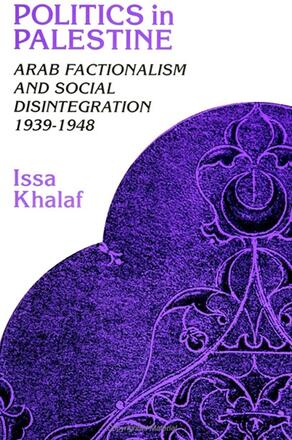
Politics in Palestine
Arab Factionalism and Social Disintegration, 1939-1948
Alternative formats available from:
Description
This book presents a coherent picture of the origins of the Palestinian problem. The author offers an analysis of factionalism in Arab society, with a detailed examination of the social and political history of the Palestinian Arabs between 1939 and 1948. Khalaf weaves together the socio-economic, sociological, political, and politico-military dimensions that have led to social disintegration. He focuses on the role of the urban elite in perpetuating factionalism and using nationalism as a weapon to deflect opposition during a period of rapid social change.
For those who are concerned with peace in Israel, the book provides a meaningful historical appreciation of a highly-charged, emotionally-laden conflict.
Issa Khalaf is Assistant Professor of Political Science at Loras College.